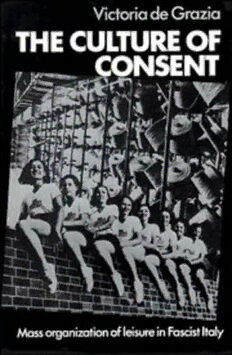
The culture of consent - Mass organization of leisure in fascist Italy PDF
320 Pages·1981·8.443 MB·English
Most books are stored in the elastic cloud where traffic is expensive. For this reason, we have a limit on daily download.
Preview The culture of consent - Mass organization of leisure in fascist Italy
Description:
The efforts of fascism to form a 'culture of consent,' or shape depoliticized activities, in Italy between the world wars, make a unique portrait of fascist political tactics. Professor de Grazia focuses on the dopolavoro or fascist leisure-time organization, the largest of the regime's mass institutions. She traces its gradual rise in importance for the consolidation of fascist rule; its spread in the form of thousands of local clubs into every domain of urban and rural life; and its overwhelming impact on the distribution, consumption, and character of all kinds of recreational pursuits - from sports and adult education to movies, traveling theaters, radio, and tourism. The author shows how fascism was able, between 1926 and 1939, to build a new definition of the public sphere. Recasting the public sphere entailed dispensing with traditional class and politically defined modes of organizing those social roles and desires existing outside the workplace.
See more
The list of books you might like
Most books are stored in the elastic cloud where traffic is expensive. For this reason, we have a limit on daily download.
